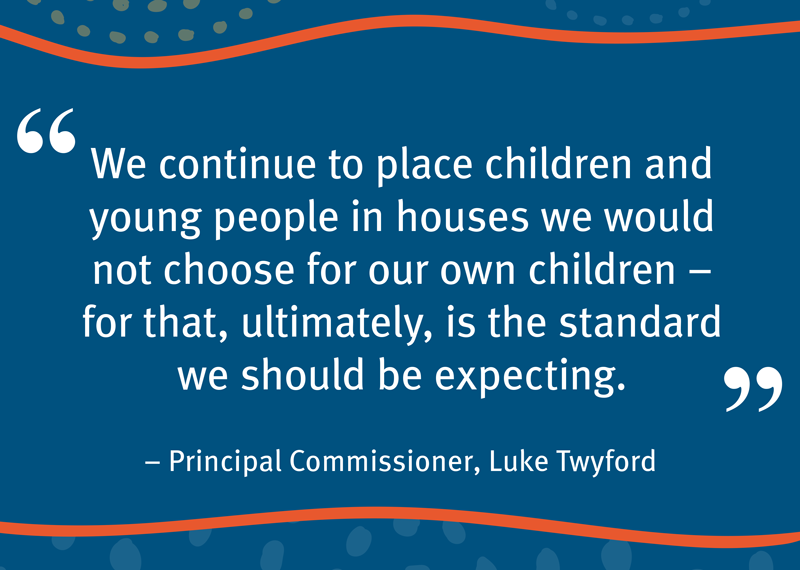QFCC releases response to residential care roadmap
29 April 2024The Queensland Family and Child Commission (QFCC) has released its response to the Queensland Government’s Residential Care Roadmap.
- The QFCC supports the roadmap and has provided its expectations on the actions it says are needed to successfully reform the residential care system.
- For the roadmap to be successfully implemented, the QFCC says young people in residential care must be meaningfully involved in decisions, coordinated action from government and the sector is needed, and roadmap actions must be prioritised with urgency.
The QFCC has responded to the Queensland Government’s Residential Care Roadmap, providing in-principle support for its 31 actions and details about further action it says is vital for effective change to occur.
The QFCC provided strategic oversight of the review into Queensland’s residential care system completed by the Department of Child Safety earlier in 2024.
As part of its strategic review, the QFCC spoke with more than 200 workers, visited 16 residential care homes, and hosted workshops with young people who have experience living in residential care.
The QFCC’s response was informed by the key concerns raised throughout the review process from young people and the sector, which centred around the need to better support kinship carers and placements, reappraise the design and intent of residential care, review funding and approval processes for providers, stabilise the workforce and build capability, and better integrate residential care with other government services.
The QFCC’s response highlights the increasing use of residential care in Queensland, with children’s placements almost doubling over the past five years from 951 in 2019 to 1763 in 2023, attributed largely to the increasing decline in foster carers in Queensland.
It says this increasing reliance on residential care will continue unless the placement system is significantly reformed.
The QFCC heard the increased demand on the system has diluted the design intent of residential care, with young people and the sector reporting tension in residential care being designed as a temporary placement but used as long-stay accommodation; conflict in views around residential care being a housing service or an intensive intervention service; and reduced connection between young people and trusted adult adults, when intensive relationships are needed.
The QFCC’s response states that successful reform relies on young people being empowered within the system, with roadmap Actions 4 and 5 offering the most significant opportunities to enable this.
Action 4 relates to young people having greater choice about their environment, routine and experiences, with the QFCC calling for minimum standards to be developed that will make residential care houses feel more like homes, not workplaces, and an implementation plan to be prioritised this year.
Action 5 relates to the design and pilot of an initiative to increase peer support and connection for children in residential care, with the QFCC calling for this to be meaningfully co-designed with young people.
The QFCC has called for implementation plans to be prioritised and developed for both Actions in 2024.
The QFCC’s response also explicitly calls for involvement of the Queensland Aboriginal and Torres Strait Islander Child Placement Peak (QATSICPP), the Queensland First Children and Families Board, and QFCC Commissioner Natalie Lewis in all reviews of First Nations children’s placements in residential care and all related policies.
The QFCC will continue to provide an ongoing oversight role in the implementation of the roadmap over the next three years, which will involve continued consultation with young people with experience of residential care and constructive engagement with government agencies and the sector.
View the QFCC’s response to the roadmap at: https://www.qfcc.qld.gov.au/sector/monitoring-and-reviewing-systems/residential-care-review
Quotes attributed to QFCC Principal Commissioner Luke Twyford
“All Queensland children deserve to live in a safe home and have trusted adults in their lives who advocate and care for them.
“I am concerned that we continue to place children in houses we wouldn’t choose for our own children, which is the standard we should be striving to achieve, without exception.
“I welcome the Residential Care Roadmap and the 31 actions government is now taking to reform the system.
“The roadmap brings together the views and experiences heard throughout the view process, and sets the foundation for change, which when delivered, will be profoundly positive for all Queenslanders.
“Our response builds on the roadmap, adding additional detail informed by the views of young people who have lived in residential care and the people who work and support them.
“Our response clearly articulates our expectation for work that needs to happen for the roadmap to be successfully implemented and for meaningful change to happen.
“Young people in care are indisputably the experts of the Child Safety system and can articulate better than anyone what they need to feel safe, valued and loved, and I appreciate their candour, creativity and honesty in contributing to this process.”
ENDS
For media information contact:
Kirstine O’Donnell | Queensland Family and Child Commission
Phone: 0404 971 164
Email: media@qfcc.qld.gov.au

